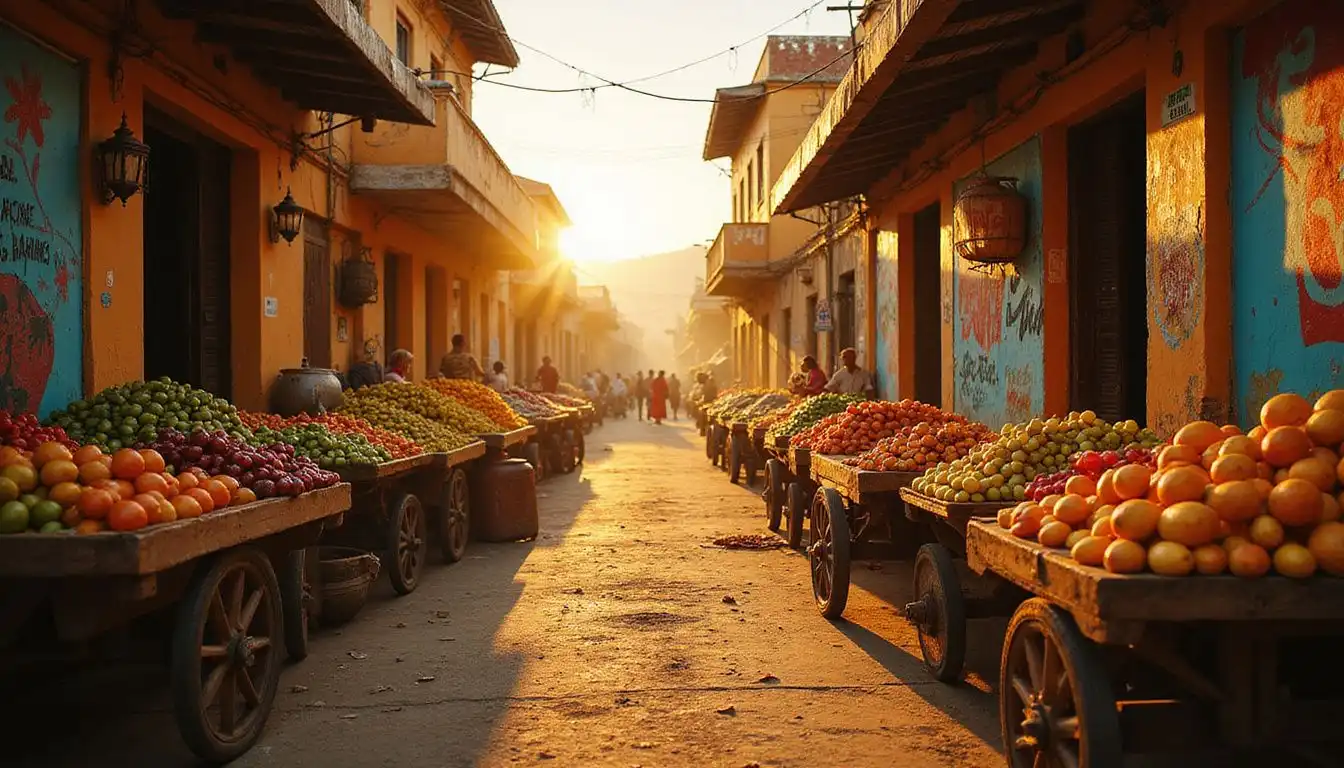Planning a trip can be hard when you want something more than beaches or shopping. Many people search for travel destinations where they can learn about new cultures and explore historical sites.
They want true cultural experiences, but do not know which places are rich in heritage.
Did you know that in 2024, over half of all trips focused on cultural heritage? Travelers love to visit UNESCO World Heritage Sites, famous landmarks, and towns full of history. These places help us connect with different customs and local traditions.
This blog will guide you through the top cultural hotspots around the world. You will discover amazing architectural landmarks, unique festivals, and ways to enjoy authentic encounters with global cultures.
Keep reading if you dream of taking your next journey beyond the usual tourist spots!
Key Takeaways
- In 2024, over half (56%) of all travelers focused on trips with cultural heritage.
- Top destinations include Japan, South Africa, Argentina, India, and Kenya. Each offers UNESCO World Heritage Sites and local festivals.
- Eating traditional foods and joining local events helps travelers understand each culture better.
- Staying at locally-owned places and buying from small businesses supports communities and makes the trip more real.
- Visiting sites like Robben Island in South Africa or ancient temples in Japan gives deep insight into each country’s past and customs.
Top Cultural Destinations for Travelers

Cultural destinations offer rich experiences for travelers. You can explore unique traditions and vibrant histories in these amazing places.
Japan

Japan is a great place to visit for cultural tourism. It has many UNESCO World Heritage Sites. Travelers can explore ancient temples, shrines, and beautiful landscapes. The country is rich in history and culture.
Visitors can experience traditional tea ceremonies and sumo wrestling matches.
Food plays an important role in Japan’s heritage. Trying sushi or ramen offers travelers authentic experiences. Cultural festivals are common throughout the year; they celebrate everything from the cherry blossom season to local customs.
Engaging with locals also enriches the trip; it helps support small businesses and creates lasting memories.
Japan’s blend of ancient traditions and modern life makes it unique.
South Africa

South Africa is a vibrant destination for cultural tourism. It offers rich heritage and diverse experiences. Visitors can explore historical sites like Robben Island, where Nelson Mandela was imprisoned.
The country has many architectural landmarks that showcase its history and culture. In 2024, a significant number of travelers focused on cultural heritage in South Africa.
There are also various festivals that highlight local traditions and customs. Trying traditional cuisine will deepen your connection to the culture. Heritage tourism here creates jobs and supports small businesses, improving life for local people.
Travelers will find unique ways to immerse themselves in the indigenous culture as they explore this beautiful nation. Next up is Argentina, another hotspot full of rich heritage and experience.
Argentina

Traveling from South Africa to Argentina brings you to a land rich in culture and history. Argentina is known for its vibrant heritage and diverse traditions. You can explore many cultural hotspots here, from the streets of Buenos Aires to the beauty of Patagonia.
UNESCO World Heritage Sites dot the country, showcasing its architectural landmarks and natural wonders. This creates great opportunities for heritage tourism. Many travelers seek authentic experiences while tasting traditional cuisine like empanadas and asado.
Visiting local markets or attending festivals can deepen your understanding of Argentine customs. Cultural tourism has become more popular, with 56% of travelers in 2024 focusing on these unique experiences.
Enjoy immersing yourself in this nation’s rich heritage!
India

Moving from Argentina to India, this country shines with rich culture and history. India is known for its many UNESCO World Heritage Sites. These sites include temples, forts, and palaces that show the country’s deep heritage.
Travelers can explore diverse traditions across different regions.
Cultural experiences in India are vibrant and varied. Enjoy spicy dishes like curry or biryani while visiting local markets. Many cities host cultural events throughout the year, such as dance festivals or music concerts.
Staying in locally-owned accommodations helps support small businesses and gives travelers a true taste of Indian life. Over 56% of travel focused on cultural heritage in 2024 shows India’s rising popularity among travelers seeking authentic experiences.
Kenya

Kenya offers many cultural experiences for travelers. It has a rich history and diverse cultures. People visit to see historical sites like the Great Rift Valley and Maasai Mara National Reserve.
Kenya is also known for its ethnic diversity, with over 40 different groups living together.
Cultural tourism in Kenya helps local communities. Heritage tourism creates jobs and supports small businesses. In 2024, travel focused on cultural heritage made up 56% of all trips taken worldwide.
Visitors can enjoy traditional cuisine and local events to dive deeper into the culture of this beautiful country.
How to Have a More Culturally Immersive Travel Experience

To enjoy a deeper travel experience, learn about local history and customs. Taste traditional foods and join in on cultural events to feel the rhythm of the place.
Learn about the local history and customs

Exploring local history and customs is key to cultural tourism. Learning about a place’s past helps travelers understand its present. Many destinations have rich heritage, from historic sites to traditions that shape daily life.
For example, Japan offers ancient temples, while Argentina is known for tango music and dance.
Travelers can visit museums and talk to locals to learn more. Engaging with the community creates authentic experiences. In India, local festivals showcase vibrant customs and traditions.
These moments enhance cultural immersion during trips and make them memorable. Visiting these places supports heritage tourism and preserves culture for future generations.
Try traditional cuisine and attend cultural events

Trying traditional cuisine is a great way to learn about a culture. Each country has unique dishes that tell stories of their history. For example, in India, you might enjoy spicy curry or sweet desserts like gulab jamun.
In Kenya, ugali is a staple food made from maize flour. Eating these meals helps you connect with local customs.
Attending cultural events also enriches your travel experience. Events often showcase dance, music, and art that reflect the community’s heritage. Festivals can be colorful and exciting; they bring people together to celebrate traditions.
Participating in these activities offers authentic experiences and memories that last forever. Cultural tourism promotes understanding and appreciation for ethnic diversity while supporting local businesses too.
Stay in locally-owned accommodations and support small businesses

Staying in locally-owned accommodations is a great way to enjoy cultural experiences. These places often reflect the local heritage and customs. They offer a personal touch that large hotels lack.
You can meet friendly locals who share their stories and traditions.
Supporting small businesses helps the community thrive. Heritage tourism creates jobs and brings money into the area, improving life for residents. In 2024, 56% of all travel focused on cultural heritage.
Choosing local stays means you are part of this growing trend in global tourism while enjoying authentic experiences at travel destinations rich in culture and history.
FAQs
1. What makes a destination a cultural hotspot?
A cultural hotspot has rich heritage, historical sites, and unique architectural landmarks. These places offer authentic experiences linked to their culture.
2. How can I find UNESCO World Heritage Sites when planning my travel destinations?
Check the official UNESCO website for a list of recognized heritage sites worldwide. Many travel guides also highlight these important locations.
3. Why is preserving cultural heritage important in global tourism?
Preserving cultural heritage protects history and supports local communities. It helps travelers enjoy real cultural experiences during their visits.
4. What are some benefits of visiting historical destinations with ethnic diversity?
Travelers learn about different cultures and traditions at these historical destinations; they gain deeper insight through diverse customs and stories.
5. How does heritage tourism differ from regular tourism experiences?
Heritage tourism focuses on exploring historical sites, architectural landmarks, and local traditions; it gives travelers meaningful connections to the past that regular trips may not provide.





Leave a Reply